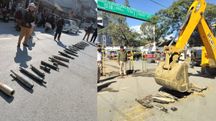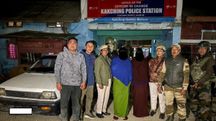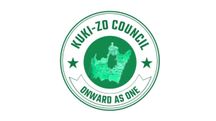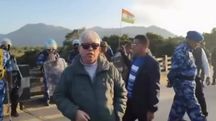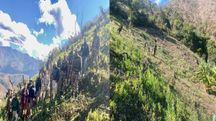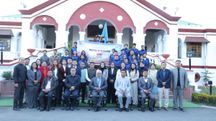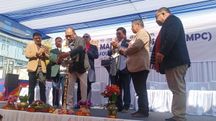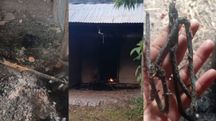Are the Bnei Menashe community of Manipur and Mizoram in danger? Who are they
Regardless of the historical validity, their presence has etched a captivating chapter in Jewish history. Belonging to the broader ethnic group of Kuki-Chin-Mizo, the B'nei Menashe embarked on their journey toward Judaism in the early 1970s.
 Are the Bnei Menashe community of Manipur and Mizoram in danger? Who are they
Are the Bnei Menashe community of Manipur and Mizoram in danger? Who are theyIn a remote corner of Northeast India, the B'nei Menashe community, with roots traced to a Tibeto-Burmese people known as the Mizos and Kukis, has emerged as a unique chapter in Jewish history. Claimed by some to be remnants of a "lost" biblical tribe, their journey unfolds across continents, intertwining with the histories of Israel and India.
Regardless of the historical validity, their presence has etched a captivating chapter in Jewish history. Belonging to the broader ethnic group of Kuki-Chin-Mizo, the B'nei Menashe embarked on their journey toward Judaism in the early 1970s.
At the heart of this cultural transformation stands T. Daniel, a visionary whose pilgrimage to Calcutta and Bombay in the 1970s laid the foundation for a profound shift. Immersing himself in the traditions of Baghdadi Jews, learning Hebrew and establishing the first congregation following rabbinical Judaism in 1974 marked a significant turning point for the B'nei Menashe.
Isaac Thangjom, the Project Director of Degel Menashe, provides a unique insight into the challenges and triumphs of the B'nei Menashe community. As a representative of the first generation that embraced Judaism in northeastern India, Thangjom delves into the intricacies of their heritage.
Addressing controversies surrounding their history, Thangjom underlined the pivotal role of faith in the community. An ongoing Oral History Project has been instrumental in unraveling their ancient traditions and practices throwing light on the rich heritage of the B'nei Menashe.
The journey towards Judaism unfolded in Churachandpur, Manipur, under the influence of global Jewish practices. To surmount the challenges faced by the community in Israel, Thangjom advocates for inclusive policies and competent leadership, highlighting the importance of identity in their successful integration.
For half of the B'nei Menashe community now residing in Israel, the path to integration has been marked by both successes and challenges. While effective leadership remains elusive, the community has not seen any cases of individuals returning to India.
However, a recent surge of violence in Manipur has rekindled concerns for their safety.The ensuing clashes resulted in casualties, village burnings, and displacements, placing the B'nei Menashe, a minority within the Kuki population, in a precarious position.
With limited communication, assessing the situation becomes challenging, leaving families in Israel and India reliant on fragmented information. The government's response is under scrutiny as the region braces for further unrest.
As Manipur struggles with violence, a delegation from Degel Menashe embarked on a mission to assess and aid displaced families. The report paints a poignant picture of the dire circumstances faced by the B'nei Menashe in the aftermath of the violence.
The delegation distributed gifts to children in displaced persons camps, highlighting the overwhelming presence of women and children as men and older boys remained in Manipur for Kuki defense efforts. The conditions in these camps varied, with some families living in reasonably comfortable situations while others faced challenges such as overcrowding and a severe lack of essential resources.
The report detailed the delegation's visit to Churachandpur, Manipur, where the team distributed supplies to displaced B'nei Menashe in various locations. The challenging road conditions, worsened by the monsoon season underlined the urgency for attention and assistance in the region.
As of December 2023, the plight of B'nei Menashe refugees continues. Ethnic Kuki refugees sought refuge in Aizawl, Mizoram, escaping violence hit Manipur. The journey was fraught with dangers, including temporary shelter in an army camp and subsequent relocation to Kangpokpi in Manipur before reaching Aizawl.
Despite the challenges, the B'nei Menashe community in Aizawl extended support to newcomers, assisting with accommodations and providing aid. The first Israeli-B'nei Menashe marriage celebrated in India brought a moment of joy amid the turmoil.
The report further detailed the mission's visit to Kangpokpi, revealing the challenges faced by B'nei Menashe in the region. Saikul village resisted Meitei attacks, while Kangchup faced devastation, leading to the burning of homes and displacement of its residents.
The urgency for Aliyah remains a constant refrain. Organizations like Degel Menashe and B'nei Menashe Councils provide aid, but the need for swift immigration to Israel is undeniable.
The B'nei Menashe community, at the crossroads of history and identity, faces a tumultuous present. Their journey, marked by faith, resilience and the quest for a homeland, urges the international community to take notice.
In the hands of time, the destiny of the B'nei Menashe unfolds and the world watches, waiting for the decisive steps that will shape their future and determine whether the echoes of their ancient past find a harmonious resonance in the present.
Copyright©2026 Living Media India Limited. For reprint rights: Syndications Today
